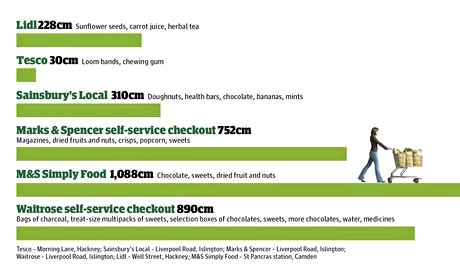
If you had to rank the following supermarkets – Tesco, Sainsbury's, Lidl, Marks & Spencer and Waitrose – according to how much they cared for their customers' nutritional wellbeing, who would come out top and bottom? I ask because Aldi has announced plans to ban sweets and chocolate from its tills following a 16-week trial. Its customers will no longer be forced to outstare calorific temptation while waiting for their turn to pay. Good for Aldi! So what about the rest?
At Tesco on Morning Lane, Hackney, the first stopping point on my tour of the supermarkets of London N1 and its environs, the checkouts seem spacious. Something is missing. There are only a few leaflets for Tesco bank. Not a chocolate bar in sight. The self-service tills shimmer dully with the glint of metal railings. It all looks remarkably bare; perhaps they could hang some art from the rails. At Sainsbury's the outlook is similar. "We were one of the first supermarkets to stop stocking confectionery at main checkouts [in 2004], and we're proud to have led the way on this," a spokesperson says. (The policy does not extend to smaller Local stores, where impulse buys loiter and the smell of doughnuts is strong.) At Lidl the last-minute "temptations" are all about price rather than calories. The assortment is eclectic: herbal teabags, fruit and carrot juice, California walnuts and multipacks of water. Confectionery was removed from checkouts in January. A cardboard display reads "Healthy checkouts".
Supermarkets have long displayed confectionery at the till. As a child, I always found this the best bit of going shopping. But over the years the displays have grown, and the little nudge to your needs – a pack of chewing gum or a lighter as a suggested accompaniment to your cigarettes, say – has grown into a confectionery corral, in which customers are herded between displays of food they have already resisted elsewhere.
Tom Sanders, professor of nutrition and dietetics at King's College London, calls it "the walk of shame". If you queue at an assisted checkout in M&S in Islington, you first must withstand a barricade of walnut whips (two boxes of three for only £2.50!). Then comes an onslaught of boiled sweets in nostalgic packaging, mints, magazines and batteries. Worse awaits if you wish to use a self-service checkout. You must pass through a queue management system lined with 7.5 metres of impulse buys – an obstacle course of popcorn, gummy sweets, magazines, dried fruit and "handy items" such as disposable shoe wipes. Make it through that lot, and there's Percy Pig to greet you. Remarkably, a man is standing next to the Percy Pigs holding just an apple. How did he manage that?
"The sweets don't really interest me," says Ben Douglas, 30. "Probably because I've educated myself about what's in them, I don't notice them."
Sadly, this is a skill not everyone possesses. "In 2012, we removed confectionery with child appeal – for example, Percy Pig – from all belted till points," a spokesperson for M&S says. But they are in full view of non-belted checkouts, and the discrepancy seems unfathomable: are children considered rarities at the self-service tills? Unfortunately, no further reply was forthcoming. And what about Waitrose? "Our policy is no sweets at supermarket checkouts," its spokesperson says. Yet this seems pernickety given that it exercises no such discretion on the area customers must pass through to reach the till, a snaking path lined with confectionery ranging in size from treat to selection box. It is notable that, of all the retailers I visited for today's supermarket sweep, the two best known for the ethics, quality and premium cost of their food are the ones that appear most ready to exploit their customers' weaknesses.
Accuracy disclaimer: these figures were obtained with a domestic tape measure, limited queue time and some embarrassment.

